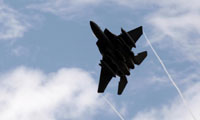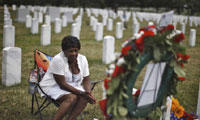Post-9/11 US policy, costs and new threats
Updated: 2011-09-02 17:11
(chinadaily.com.cn)
|
|||||||||||
War
|
 |
Within a week of the attacks, the US Senate voted 98-0 and the House voted 420-1 to give the President the authority to "use all necessary and appropriate force to against the nations, organizations and persons" behind the attacks. Soon, the US led a NATO invasion of Afghanistan, instigating the "Global War on Terror".
Costs

October 7, 2011 will mark ten years since the beginning of the US war in Afghanistan. In the 10 years since US troops went into Afghanistan, spending on the conflicts totaled $2.3 trillion to $2.7 trillion.
Those numbers will continue to soar when considering often overlooked costs such as long-term obligations to wounded veterans and projected war spending from 2012 through 2020. The estimates do not include at least $1 trillion more in interest payments coming due and many billions more in expenses that cannot be counted, according to according to the research project "Costs of War" by Brown University's Watson Institute for International Studies.
Death
|
 |
The August deaths bring the number of Americans killed in the Afghan war to 1,755, according to icasualties.org. Meanwhile, as of Aug 16,at least 4474 members of the US military had died in the Iraq war since it began in March 2003.
In total, 224,000 to 258,000 people have died directly from warfare, including 125,000 civilians in Iraq. Many more have died indirectly, from the loss of clean drinking water, healthcare, and nutrition. For every person killed on September 11, another 73 have been killed since. Osama bin Laden and Saddam Hussein are dead, but Iraq and Afghanistan are far from stable.
War-weariness
Of 100,000 US troops in Afghanistan, 33,000 will leave by mid-2012, even as a still-potent Taliban insurgency is focused on suicide attacks against government officials and foreign targets.
US war-weariness after Iraq and Afghanistan has become so pronounced that advocacy of a muscular US foreign policy pushed by former Republican presidential candidate John McCain in 2008 has gotten little emphasis among Republicans vying to challenge President Barack Obama in 2012.
Obama has pledged to formally end the American military presence in Iraq by the end of this year, but for the past several months the Administration has been involved in discussions with the Iraq government about extending the mission.
The number of Americans who say the government should do whatever it takes to protect its citizens against terrorism -- even if it means violating civil liberties -- has dropped almost in half since the days after 9/11, according to a USA Today/Gallup Poll.
In January 2002, 47 percent of respondents said they were willing to have the government violate their "basic civil liberties" in order to prevent additional acts of terrorism. When asked last month, only 25 percent said they favored such a trade-off.
New threats
The killing of al-Qaida chief Osama bin Laden means that the world's biggest terrorist has vanished, but the international community still has a long way to go in its fight against terrorism.
A decade after the 9/11 attacks, a "lone wolf terrorist" like the shooter in Norway now presents a bigger risk to the United States than a large-scale operation, President Barack Obama said on Aug 16.
"The most likely scenario that we have to guard against right now ends up being more of a lone wolf operation than a large, well-coordinated terrorist attack," Obama told CNN.
"When you've got one person who is deranged or driven by a hateful ideology, they can do a lot of damage, and it's a lot harder to trace those lone wolf operators," he said.
But former Secretary of State Condoleezza Rice said a key lesson of the Sept 11, 2001 terrorist attacks is that the greatest threats to the US can come from “failed states” that cannot control their territory.
Rice said in a speech in Columbus on Aug 29 that the US cannot afford to leave Afghanistan an "ungoverned territory" after invading it.
- Egyptians break into Israeli Embassy in Cairo
- World took a stand after 9/11: Locke
- 11 dead in C China ferry sinking
- Birth defects still a challenge
- Ministry: China to further facilitate investment
- State Council demands spill probe
- Little role of NATO in anti-terrorism
- Internet major source of rumors: poll
Hot Topics
Libya conflict, Gaddafi, Oil spill, Palace Museum scandal, Inflation, Japan's new PM, Trapped miners, Mooncake tax, Weekly photos, Hurricane Irene
Editor's Picks

|

|

|

|

|

|







